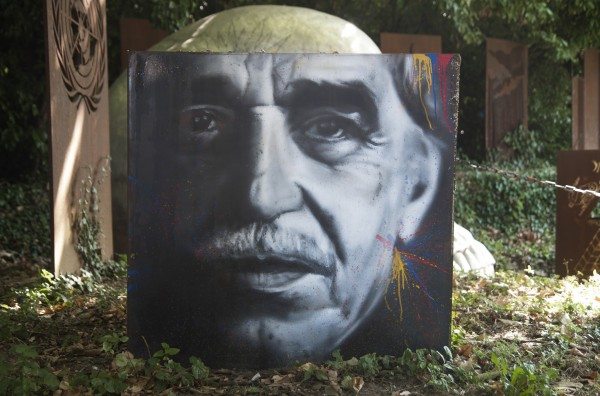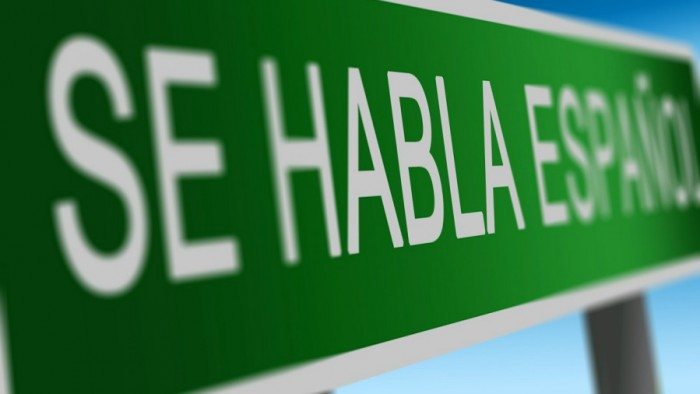Latino issues, as they are presented in the media and in our communities, have more or less calcified and threaten to become parody. When a Latino celebrity or media personality is asked onto a show, what do they speak about? Immigration. No matter which country you come from in Latin America, your issues are eventually whittled away until they can fit into the putrid-smelling box that is immigration. Even attempts to decrease stereotypes of Latinos in the arts by showing us as coming from all walks of life, those journeys are inevitably tied to achieving the American Dream and fulfill the promise of the immigration that brought us here.
No matter what we do, we cannot escape the subject of us being foreigners. Here, and yet not here. The modern Latino movement is predominantly driven not just by our outsider status but by our obnoxiously overwhelming desire to no longer be outsiders. In the immigration debate, no matter which group is being talked about, the assertion that these people are or want to be Americans — that they love this country, its values, its people and its freedoms — is touted before anyone who will listen. Yet at the same time, Latino activists are the first to tout the great things about Latino culture, like the food, the music, the fashions and the art. Just not the language.
I don’t mean Spanglish. I mean straight-up Spanish. To be fluent and celebrating the beauty and the fact that what binds together this region of 21 countries is that, in spite of their myriad differences, Latinos can all understand one another, is brushed aside. What has been prevalent recently have been videos which showcase the growing community of Latinos who choose not to learn Spanish for one reason or another (and it is a choice) but are frustrated by the expectation of Latinos and whites alike for them to know the language.
Spanish, and one’s proficiency in it, is being seen by a whole generation as a burden, a wall that prevents them from being fully accepted by the society they grew up in. Spanglish was the happy medium, where we could celebrate both sides of our culture. To utilize Spanglish was viewed as a method for empowerment, but for many young Latinos and Latino activists, Spanish is anathema.
Yet to promote one’s latinidad is to promote the culture itself, and culture is intimately tied to the language in which it is communicated. And don’t start with me about how Spanish was a colonial language forced upon natives and so you don’t want to learn it because it’s the language of your oppressors. Is English any better in terms of colonialism and Native American genocide? Why speak English but not Spanish? Why embrace Latino values, culture and traditions, but not the language associated with it? Why aren’t Latino activists promoting bilingualism and trying to push the United States to promote multilingualism in the education system and greater tolerance of minority languages?
Well, it has something to do with articles like this.
Quite simply, native Spanish speakers are to blame for U.S.-born Latinos not learning or championing the language of their people. While some might argue that assimilation is inevitable in immigrant communities, what about peoples who are officially stateless in a hostile country, like the Kurds, the Basques or, until 1948, the Jews? Those groups have made preservation of their language central to the cohesiveness and survival of their race. The Jews did it for almost 2,000 years, and the Kurds and Basques have been doing it for hundreds of years. So why can’t Latino immigrants keep their language alive for more than a generation?
Well, it doesn’t help that pretty much every Latino has a story similar to this one:
Growing up, my dad wanted only English spoken around the house. Him and my mom believed you couldn’t teach children two languages at the same time, and even though my mom tried to teach us some things here or there, they never really stuck. My cousins on the island would make fun of me, say I wasn’t really Puerto Rican because I didn’t speak Spanish. Whenever I met a Spanish speaker, they would shame me for not speaking the language and ask why my parents didn’t teach me. When I did attempt to speak, and I’d make a mistake, I would be either made fun of or the person would switch to English. Whenever I spoke and did not make a mistake, I would be told I did not speak Spanish ‘correctly’ or that I ‘had no accent.’ Eventually, I had a big inferiority complex about speaking the language that I never got over.
With the exception of the last sentence, the story is my own. I did have an inferiority complex, but I got over it and eventually became fluent. (But more on that later.)


Statue of 17th-century author Miguel de Cervantes at the entrance of Spain’s National Library. Spanish is often called “the language of Cervantes” (Luis García/Flickr)
I recently asked Yo Soy Latina author Linda Nieves-Powell about the subject, and here is what she had to say:
I think because if you are a Latino who chooses to speak English, their perception is that you are selling out or you are not to be trusted because you are not a “true Latino” because of course, real Latinos speak Spanish. Lol. I have to tell you that even when I tell people I understand it but don’t speak it, they continue to push the issue.
That’s right, native speakers: you all are assholes.
You also have no one to blame but yourselves, and before you get too angry by my saying that, hear me out. If you leave your country for one with a different dominant language, and you raise your kids giving them hell over their use of your mother tongue, and you use it as a source of criticism and shame, while at the same time telling everyone how proud you are to be in this new country and that you are making a better life than what was in your old country, so inevitably you make the old country seem like a backward hell hole, and your kid grows up not caring for either your homeland or its language, your kid isn’t to blame. You are.
That is the contradiction at the heart of so many Latino identity crises and issues. How can we expect Latino unity when half our population makes us feel bad for not meeting a certain standard of latinidad? How can you expect people to carry on traditions and maintain the culture, when you all but tell them they have to abandon the old ways in order to fit in and achieve the American Dream? The behavior is beyond hypocritical, and it is the reason why when I see a video of a slam poet bashing the Spanish language and how she associates Spanish with all the bad things in her life, and the comment boards are praising her to high heaven and calling her brave (for what, I am not sure), I cannot help but feel sad. Sad for her. Sad for my community. Sad for all those people who praised her because at some point in their past, they were made to feel ashamed for the fact that their parents left their homeland. Worse of all, the people who made them feel ashamed were most likely their own parents.
You see, I love Spanish. It is an incredibly beautiful, lyrical, and profound language. Speaking more than one language is scientifically proven to increase brain functions and expand a person’s learning abilities. Being multilingual allows a person to understand multiple perspectives, because built into every language is a worldview that is distinct and, when coupled with another culture, can better inform a person on why their dominant culture is the way it is. It also opens up job opportunities, travel opportunities and the opportunity to discover great literature, music and movies in the original languages.


Gabriel García Márquez, author of ‘Cien años de soledad’ (thierry ehrmann/Flickr)
Appreciating art is actually how I came to be fluent in Spanish. When I was 18 I read One Hundred Years of Solitude. It was the first novel I read by a Latino author, and while I had taken Spanish in high school, I never took it very seriously due to the aforementioned inferiority complex. Yet reading that classic novel made me determined to read Marquez in his original language. To read and understand his poetic narratives the way he meant for them to be read became an obsession of mine, and so when I became fluent and earned a degree in Spanish studies, it wasn’t so I could impress my cousins or strangers, or even so I could go back to the island and communicate with everyone in our native tongue. No, it was so I could experience these wonderful artists as they had expressed themselves, rather than through the filter of a translator. As a result, for a while I read Spanish better than I spoke it, but once I met my wife and she encouraged me to speak more, I improved in that area as well. The negative connotations I had grown up with eventually faded away, and I came to see how integral Spanish is to being Puerto Rican.
I don’t want to make the mistake of my elders and use this moment to chastise you for understanding Spanish but not speaking it, or only knowing a few phrases, or none at all. I’ve just demonstrated my first-hand knowledge of how wrong that is. Instead, I encourage native speakers, when you come across a Latino who isn’t a fluent Spanish speaker, that you ask them about their interests and maybe recommend a musician, a filmmaker or a writer from their country of origin and inspire them to become a fan. Maybe they still won’t learn the language, but they will create a positive relationship with the culture and, in turn, with Spanish as well. Preserving a culture requires cultivating appreciation, and that begins with our elders and native speakers dropping the shame tactics, dropping the arrogance and purity tests, and instead being a positive spokesperson for the beautiful Latino cultures who proudly express themselves in Spanish.
***
Jonathan Marcantoni is a Puerto Rican novelist and co-owner of Aignos Publishing. His books, Kings of 7th Avenue and The Feast of San Sebastian, deal with issues of identity and corruption in both the Puerto Rican diaspora and on the island. He is co-founder (with Chris Campanioni) of the YouNiversity Project, which mentors new writers. He holds a BA in Spanish studies from the University of Tampa and a MH in creative writing from Tiffin University. He lives in Colorado Springs and can be reached at jon.marcantoni@gmail.com.




Boricuas complejistas LOL
The Talmud must not be regarded http://utamadomino.com as an ordinary work, composed of twelve volumes; http://utamadomino.com/app/img/peraturan.html it posies absolutely no similarity http://utamadomino.com/app/img/jadwal.html to http://utamadomino.com/app/img/promo.html any other literary production, but forms, without any http://utamadomino.com/app/img/panduan.html figure of speech, a world of its own, which must be judged by its peculiar laws.
The Talmud contains much that http://utamadomino.com/ is frivolous of which it treats with http://dokterpoker.org/app/img/peraturan.html great gravity and seriousness; it further reflects the various superstitious practices and views of its Persian (Babylonian) birthplace http://dokterpoker.org/app/img/jadwal.html which presume the efficacy of http://dokterpoker.org/app/img/promo.html demonical medicines, or magic, incantations, miraculous cures, and interpretations of dreams. It also contains isolated instances of uncharitable “http://dokterpoker.org/app/img/panduan.html judgments and decrees http://dokterpoker.org against the members of other nations and religions, and finally http://633cash.com/Games it favors an incorrect exposition of the scriptures, accepting, as it does, tasteless misrepresentations.http://633cash.com/Games
The Babylonian http://633cash.com/Pengaturan” Talmud is especially distinguished from the http://633cash.com/Daftar Jerusalem or Palestine Talmud by http://633cash.com/Promo the flights of thought, the penetration of http://633cash.com/Deposit mind, the flashes of genius, which rise and vanish again. It was for http://633cash.com/Withdraw this reason that the Babylonian rather http://633cash.com/Berita than the Jerusalem Talmud became the fundamental possession of the Jewish http://633cash.com/Girl Race, its life breath, http://633cash.com/Livescore its very soul, nature and mankind, http://yakuza4d.com/ powers and events, were for the Jewish http://yakuza4d.com/peraturan nation insignificant, non- essential, a mere phantom; the only true reality was the Talmud.” (Professor H. Graetz, History of the Jews).
And finally it came Spain’s turn. http://yakuza4d.com/home Persecution had occurred there on “http://yakuza4d.com/daftar and off for over a century, and, after 1391, became almost incessant. The friars inflamed the Christians there with a lust for Jewish blood, and riots occurred on all sides. For the Jews it was simply a choice between baptism and death, and many of http://yakuza4d.com/cara_main them submitted http://yakuza4d.com/hasil to baptism.
But almost always conversion on thee terms http://yakuza4d.com/buku_mimpi was only outward and http://raksasapoker.com/app/img/peraturan.html false. Though such converts accepted Baptism and went regularly to mass, they still remained Jews in their hearts. They http://raksasapoker.com/app/img/jadwal.html were called Marrano, ‘http://raksasapoker.com/app/img/promo.html Accursed Ones,’ and there http://raksasapoker.com/app/img/panduan.html were perhaps a hundred thousand of them. Often they possessed enormous wealth. Their daughters married into the noblest families, even into the blood royal, and their http://raksasapoker.com/ sons sometimes entered the Church and rose to the highest offices. It is said that even one of the popes was of this Marrano stock.
[…] broadcast that featured the Mexican national team. It was a perfect encapsulation of the shame that English-dominant Latinos feel when Spanish-dominant Latinos act as the sole judges of identity and […]
[…] broadcast that featured the Mexican national team. It was a perfect encapsulation of the shame that English-dominant Latinos feel when Spanish-dominant Latinos act as the sole judges of identity and […]
[…] broadcast that featured the Mexican national team. It was a perfect encapsulation of the shame that English-dominant Latinos feel when Spanish-dominant Latinos act as the sole judges of identity and […]